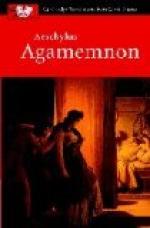P. 9, l. 192, Winds from Strymon.]—From the great river gorge of Thrace, NNE; cf. below, l. 1418.
P. 9, l. 201, Artemis.]—Her name was terrible, because of its suggestion. She demanded the sacrifice of Agamemnon’s daughter, Iphigenia. (See Euripides’ two plays, Iphigenia in Tauris and Iphigenia in Aulis.) In other poets Agamemnon has generally committed some definite sin against Artemis, but in Aeschylus the death of Iphigenia seems to be merely one of the results of his acceptance of the Sign.
P. 10, l. 215, ’Tis a Rite of old.]—Literally “it is Themis.” Human sacrifice had had a place in the primitive religion of Greece; hence Agamemnon could not reject the demand of the soldiers as an obvious crime. See Rise of Greek Epic, pp. 150-157.
P. 11, l. 246, The Third Cup.]—Regularly poured to Zeus Soter, the Saviour, and accompanied by a paean or cry of joy.
P. 11, l. 256, This Heart of Argos, this frail Tower:]—i.e. themselves.
P. 11, l. 264, Glad-voiced.]—Clytemnestra is in extreme suspense, as the return of Agamemnon will mean either her destruction or her deliverance. At such a moment there must be no ill-omened word, so she challenges fate.
P. 12, l. 276, A word within that hovereth without wings.]—i.e. a presentiment. “Winged words” are words spoken, which fly from speaker to hearer. A ‘wingless’ word is unspoken. The phrase occurs in Homer.
Pp. 13 ff., ll. 281 ff.]—Beacon Speech. There is no need to inquire curiously into the practical possibility of this chain of beacons. Greek tragedies do not care to be exact about this kind of detail. There may well have been a tradition that Agamemnon, like the Great King of Persia, used a chain of beacons across the Aegean.—Note how vividly Clytemnestra’s imagination is working in her excitement. She seems to see before her every leaping light in the chain, just as in the next speech she imagines the scene in Troy almost with the intensity of a vision.
P. 14, l. 314, Victory in the first as in the last.]—All are Victory beacons; the spirit of Victory infects them all equally. Cf. l. 854 below, where Agamemnon prays that the Victory which is now with him, or in him, may abide.
P. 15, l. 348, A woman’s word.]—Her hatred and fear of Agamemnon, making her feel vividly the horrors of the sack and the peril overhanging the conquerors, have carried her dangerously far. She checks herself and apologizes for her womanlike anxiety. Cf. l. 1661, p. 77.
P. 18, ll. 409 ff., Seers they saw visions.]—A difficult and uncertain passage. I think the seers attached to the royal household (cf. Libation-Bearers, l. 37, where they are summoned to read a dream) were rather like what we call clairvoyants. Being consulted, they look into some pool of liquid or the like; there they see gradually emerging the palace, the injured King, the deserted room, and at last a wraith of Helen herself, haunting the place.




